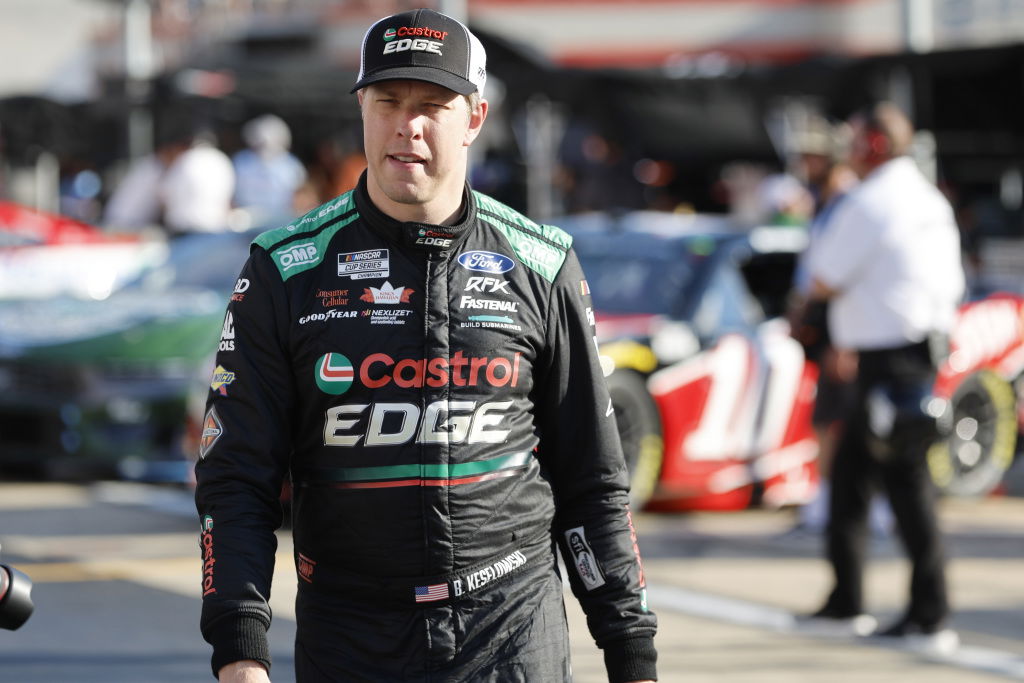
Imago
Danny Hansen/Motorsport Images

Imago
Danny Hansen/Motorsport Images

Imago
Danny Hansen/Motorsport Images

Imago
Danny Hansen/Motorsport Images
More recently, NASCAR has moved aggressively. The sanctioning body filed a motion for summary judgment, seeking a court decision without a full trial. Among its arguments, many of 23XI/FRM’s claims are time-barred; the teams had previously signed releases, and the teams voluntarily accepted the charter framework when entering ownership. To buttress its position, NASCAR submitted a declaration from many team owners, including Brad Keselowski, each affirming support for the charter system and the need for its stability.
Watch What’s Trending Now!
However, Denny Hamlin has made it clear he isn’t trying to play the outlaw; he just wants people to see who is really pulling the strings in this dispute. But as many more drivers and team owners weigh in, the tension keeps building, leaving Hamlin and 23XI with the feeling that the sport they have helped grow has turned its back on them.
Speaking to Bob Pockrass, Brad Keselowski put on his owner’s hat and expressed his desire for the charter system to stay: “You know, I think all the owners really just want to be smart and trying to be somewhat neutral, but also recognize that it’s important for our employees. It’s important for our sponsors that the charter system remains intact, so there’s a balancing act here.”
With more than a decade in the Cup Series, the 41-year-old balances dual responsibilities as both a driver and a co-owner of RFK Racing. He pushed back against the accusations that NASCAR operates as a monopoly, citing his freedom to compete in the rival Superstar Racing Experience (SRX) as proof. He noted that he was allowed to run the full six-race SRX schedule in 2023 without any restrictions from NASCAR.
Brad Keselowski on doing a declaration for NASCAR in the 23XI/FRM-NASCAR lawsuit in support that the charter system remains. He said they are hoping the two sides will settle. pic.twitter.com/Qn4NFEODvT
— Bob Pockrass (@bobpockrass) October 4, 2025
In his official statement, he wrote, “As a successful driver, I love competing in all sorts of motorsports. I was approached by a short-track series called Superstar Racing Experience (SRX) about driving in SRX races. SRX was a series composed of stock vehicles that raced on short tracks in America. Unlike many motorsports series, including the Cup Series, there were no separately owned teams in SRX. Instead, SRX owned all cars, directly hired drivers, and provided the pit crews.”
While NASCAR has official rules that limit Cup Series drivers with more than a few years of experience to only 5 starts in each of the Xfinity and Truck Series, the rules regarding truly outside ventures like SRX are often less codified but heavily influenced by corporate relations.
Before the lawsuit ever reached the courtroom, NASCAR teams had one unified goal: securing permanent charters. For over two years, the Race Team Alliance had been advocating for this change, arguing that the absence of permanent charters threatened both sponsor confidence and financial stability.
Tensions exploded when NASCAR unveiled a new charter proposal with a tight deadline last year, one that seemingly ignored those long-standing concerns. Hence, in response, Michael Jordan and Denny Hamlin took a stand, refusing to sign the deal and filing a lawsuit that would send shockwaves through the sport.
NASCAR has now gone on the offensive. They accused 23XI Racing of trying to destroy the sport, as stated in a motion for summary judgment: “Neither greed, nor an individual’s bruised ego over his inability to deliver on some promises he made to other teams, justifies trying to destroy an institution.”
However, Denny Hamlin clapped back using NASCAR attorney Christopher Yates’ words, saying, “NASCAR would be perfectly fine going back to that pre-charter model.” His caption: “In case you’re wondering who threatened the system.” And as the fight goes on, all eyes and ears will be open for the next update.
However, while this may look like some sort of betrayal for Denny Hamlin, the No. 6 Ford RFK driver still pushes for another framework within NASCAR to change.
Brad Keselowski calls out the NASCAR playoff system
In a candid conversation with Jeff Gluck of The Athletic, he didn’t hold back his thoughts on NASCAR’s current playoff format, a system that has long divided fans, drivers, and team owners alike. Having raced through the evolution from the old full-season, 36-point championship to the modern 10-race elimination format, the 2012 NASCAR Cup Series champion spoke from experience and frustration.
He very bluntly said, “The whole playoff thing has to go away. The nuance of having 10 races that are more important than 20-some others is very unhealthy for the sport. It’s demeaning to the other tracks and races.”
Keselowski went on to argue that the emphasis on a few select races hurt the sport’s appeal, especially when those playoff events clash with other major sports. He added, “And unfortunately, those 10 races that are supposed to mean more are in direct competition with other sports. It muddies the water. It’s not working for the sport.”
As NASCAR leadership has continuous internal discussions with its playoff committee, the future of the current system remains uncertain. Whether Brad’s comments are meaningful reforms or simply reignite old debates, one thing is clear—the playoff structure remains one of the most polarizing topics in modern NASCAR.



